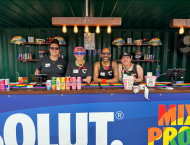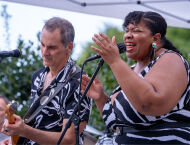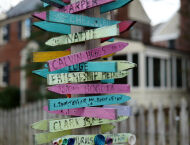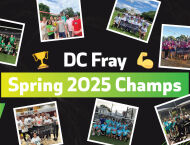Culture
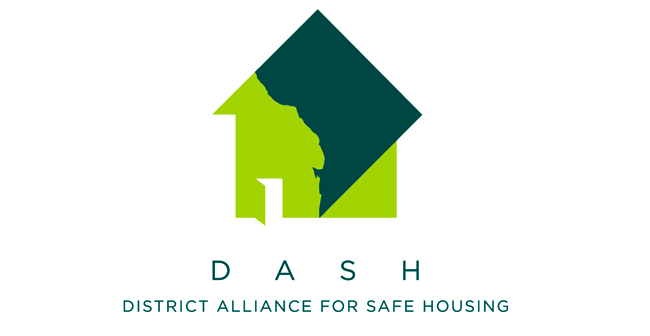 Photo courtesy of DASH
Photo courtesy of DASH
Q&A with District Alliance for Safe Housing (DASH)
July 25, 2018 @ 12:00am
At Red Derby’s latest Tiki Party, each umbrella-topped rum punch was another few dollars donated for notebooks, backpacks and more back-to-school gear. The restaurant in NW, DC raised over $1,500, supporting the child residents of District Alliance for Safe Housing ,or DASH. Their goal before summer’s end is $3,000.
DASH serves domestic violence survivors and their families to provide them with temporary housing in DC for up to 24 months. During this time, survivors work with an advocate to plan for an independently sustained life, safe from their abuser. Their next fundraiser, the DASH Kids Art Show Silent Auction, will be Thursday, September 13 at Red Derby, 6 p.m.
On Tap spoke with DASH’s executive director Koube Ngaaje, community housing program manager Crystal Jacobs and director of development Meghan McDonough about their services and common issues associated with shelters and domestic violence.
On Tap: What were the options for domestic violence survivors before DASH was formed in 2006?
Koube Ngaaje: We call the residents survivors of domestic violence because they have survived a lot to get to where they are, and housing is really scarce in DC, let alone affordable housing. So before DASH came on the scene, these survivors had to choose between being homeless or staying in an abusive relationship. We try to make sure they never have to make that decision. So they have a safe space that they can go to.
OT: How is your housing model different from other shelter services?
Crystal Jacobs: We have two scattered-site programs. For one, the population is [survivors of] domestic violence and/or sexual assault. The other program, which is fairly new, is specific for HIV as well as domestic violence. You have to have a dual diagnosis of both in order to access the program. But in general, [for] our families transitioning, we do like to make that step seamless. In the Empowerment Project we give them [free housing for] 24 months – at the end of the 24 months we want to make sure that their renting history is clean. Our goal is not to give full month’s rent from here to stay. Our goal is to help them get to the next steps.
KN: When a lot of people hear the word “shelter” or “homeless services provider,” they automatically do think of dormitory style. Being truly apartment-style [makes DASH different]. It’s tough when you’re in dormitory style because you’re working with people who have experienced so many forms of trauma. The ability for a survivor to have their own space: their own kitchen, their own bathroom, helps take away some of those pressures of community style living. Because of that we are able to house, in this building, male survivors and female survivors. [Each room houses] different configurations of families – from a one person household to a six-person household with children, a 16-year-old male living with a grandmother, or a family who has little ones from six months all the way up to 15. So that flexibility is unique to DASH.
OT: Do you provide job assistance as well?
CJ: [Within 24 months] That should be one of the goals– if you’re not employed, how can you get employed so you can live in the community on your own? Sometimes people are successful and sometimes some people aren’t. We’re not like a job bank. We get resources, we put them out there, we encourage them to seek those services and see exactly what that can look like for them.
KN: And that is really unique to DASH, that premise of having the survivor be the determinant factor in what success looks like for them. It’s not a cookie-cutter approach, nothing is required of a survivor to do in order to participate in services and receive services from us. And some people are with us for the full 24 months. Some people come in and, based on where they are, can make steps and move out of our program within 12 or 18 months. Some people are only here for six months.
OT: What are some misconceptions and stigmas associated with domestic violence?
KN: A misconception is that domestic violence only happens behind closed doors. But the truth of the matter is one out of every four women have or will experience domestic violence in their lifetime. In 2016, we served about 366 survivors and their families. In 2017, we served 688 survivors and their families, and we are well on track to surpass that for this fiscal year. We know in the coming years we’ll be called upon to do even more, especially because the cost of living continues to rise in DC. DASH has always been an innovator in that space of domestic violence and homelessness, and the reason why our programs do so well is that we’ve got the data to back it up, we know these services work.
Meghan McDonough: DASH does welcome male survivors. Typically people may think of domestic violence affecting only women, or even only women of color, and that’s not true. It affects all communities.
CJ: We have the transgender community that accesses us, something else that makes us unique. Transgender singles have a lot of barriers in itself. So gender identity in certain shelters can look different ways depending on the shelter. We’ll take your 16 year old son. A lot of shelters are like ‘if they’re over 12 they can’t come here.’ So we’ll take what other shelters don’t want to deal with. We have an array of folks here, it doesn’t look one way.
MM: Because we provide apartment-style living here, a lot of other shelters are dormitory style so that sets up limitations right there for male survivors or women with teenage male sons.
OT: Why do you think the number of survivors is increasing?
KN: I think there are higher incidents of domestic violence. And not only are there more instances but people are probably more comfortable coming forward now, given the narrative that’s happening on the national and global scale. But we also recognize that for as many survivors that come forward for assistance, there are probably just as many who don’t. One of the biggest populations that we’re seeing an increase is in our elder population. Sometimes it’s not physical or sexual abuse, it’s emotional abuse… [survivors] being emotionally abused for 30 years, [and] have no sense of identity when you come into a program like DASH. One of our older residents said “this is the first time I’ve been able to prepare my own meals.” Or another resident who said “my abuser keeps calling me,” and we’ve said why do you keep answering? “Because I’ve always had to answer.” Well, [now] you don’t have to answer. Those instances tell us the occurrences are becoming more prevalent but there is also more work that has to be done.
Support DASH’s mission by visiting their website for more information and ways to donate, and/or by attending the DASH Kids Art Show Silent Auction on Sept. 13 at 6 p.m.
Red Derby: 3718 14th St NW, DC; www.dashdc.org




